Quartz vs Quartzite: Which is the Right Countertop for Your Home?
Deciding on the right countertops material to use in a kitchen or bathroom remodel can be overwhelming. With so many different styles, colors and stones, it can be a lot to take in. The most important consideration, of course, is deciding on which material is the right fit in YOUR home. For example, do you have a busy kitchen? If so, you’ll need a durable stone that can withstand spills and heat from hot pots and pans. Are you on a budget? There are certain countertop materials that are more economically-friendly and require less maintenance over time for you to consider.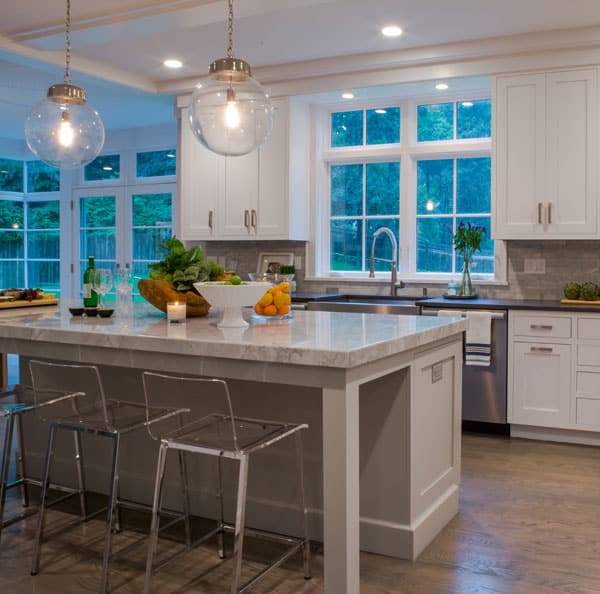
One question we frequently hear from customers: What’s the difference between quartz vs quartzite? Even though these two countertop materials sound very similar, they have their own set of unique properties that may make one material a better fit for your home versus the other.
Here are the key differences between Quartzite vs Quartz countertops:
Quartzite is:
- A natural stone material
- Spill, stain, and heat resistant naturally
- UV resistant
- Needs to be periodically sealed
Quartz is:
- A manufactured material that may contain natural stone
- Created by different manufacturers including:
- Caesarstone, Cambria®, Alleanza, and Cosentino
- Available in larger sizes than natural stone slabs
- Mold, mildew, spill, and stain resistant
- Slightly less heat resistant than natural stone
- Does not need to be sealed
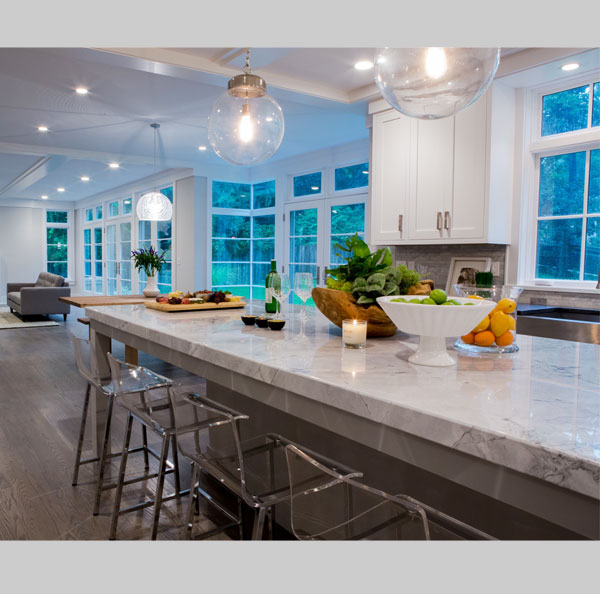
Shown: White Vermont Quartzite from our portfolio
Why should a homeowner choose Quartzite?
Sparkles!
Embedded in Quartzite are tiny quartz crystals that catch the light and sparkle. If you are distracted by anything with sequins, glitter, jewels, or crystals, Quartzite will speak to you. This is not to say, it’s not elegant. It certainly is. It’s perfect in high-end designs both elaborate and minimalist. Quartzite features organic glitter brought to you by nature.
Because of its razzle-dazzle nature and comparative rarity, Quartzite is the most expensive natural-stone choice for your countertops. For a breakdown of the cost of natural stone countertops, click here.
Quartzite is a favorite of outdoor kitchen and patio designers as it is the most UV resistant natural material. It stands up extremely well to the outdoor elements.
Like marble and granite, Quartzite is formed under tremendous natural forces of heat and pressure in the Earth’s crust. It naturally has a hardness of 7 on the Mohs scale. The Mohs scale compares the scratch resistance of various materials. It’s stronger than steel which ranks around 5 on the Mohs scale, but not as strong as Sapphire (9) and Diamond (10). It can handle day-to-day encounters with pots and pans, platters, etc.
However, it is recommended that all natural stone be protected with the use of cutting boards, trivets, etc. Cutting directly on natural stone can hurt your knives, and acidic fruits and liquids like wine may stain or etch natural stone countertops.
Natural stone countertops are porous and need periodic sealing to help them resist stains and other damage. At Academy Marble & Granite, we are happy to help you select the right countertop material for your needs and give you recommendations on how to keep your new countertops looking their best.
Before you decide on your countertop material, make an effort to see some Quartzite slabs in person. They really are beautiful. We have a selection to view at each of our locations.
Why should a homeowner choose Quartz?
Size and variety are big factors.
Since Quartz is manufactured and not cut from natural stone quarries, Quartz is available in larger sizes. Quartz can also be ordered in more or less unlimited quantities. For example, if you fall in love with a slab of granite, you may not be able to find enough matching stone if you have an extremely large kitchen, or want to use the same counter-material throughout your estate. Quartz, on the other hand, can be made to order with a consistent pattern and texture for your entire project.
Quartz also has a large practical benefit: it is not porous like natural stone materials. Quartz is made by combining natural stone materials with stabilizing resins or similar bonding agents. These agents create a completely smooth surface which is significantly more resistant to things like mold, mildew, and staining. Since the surface is not porous it does not need sealing.
However, its bonding agents are less heat resistant than natural stone. Quartz products are more likely to be burnt if a hot pan is placed directly on its surface. Be sure to use trivets and other means to protect a Quartz surface from heat.
Because Quartz is manufactured, it’s a decorator’s dream. The color, pattern and texture choices are extensive.
Caesarstone makes Quartz countertops that model marble and granite patterns, and also industrial-looking choices with rough finishes like concrete.
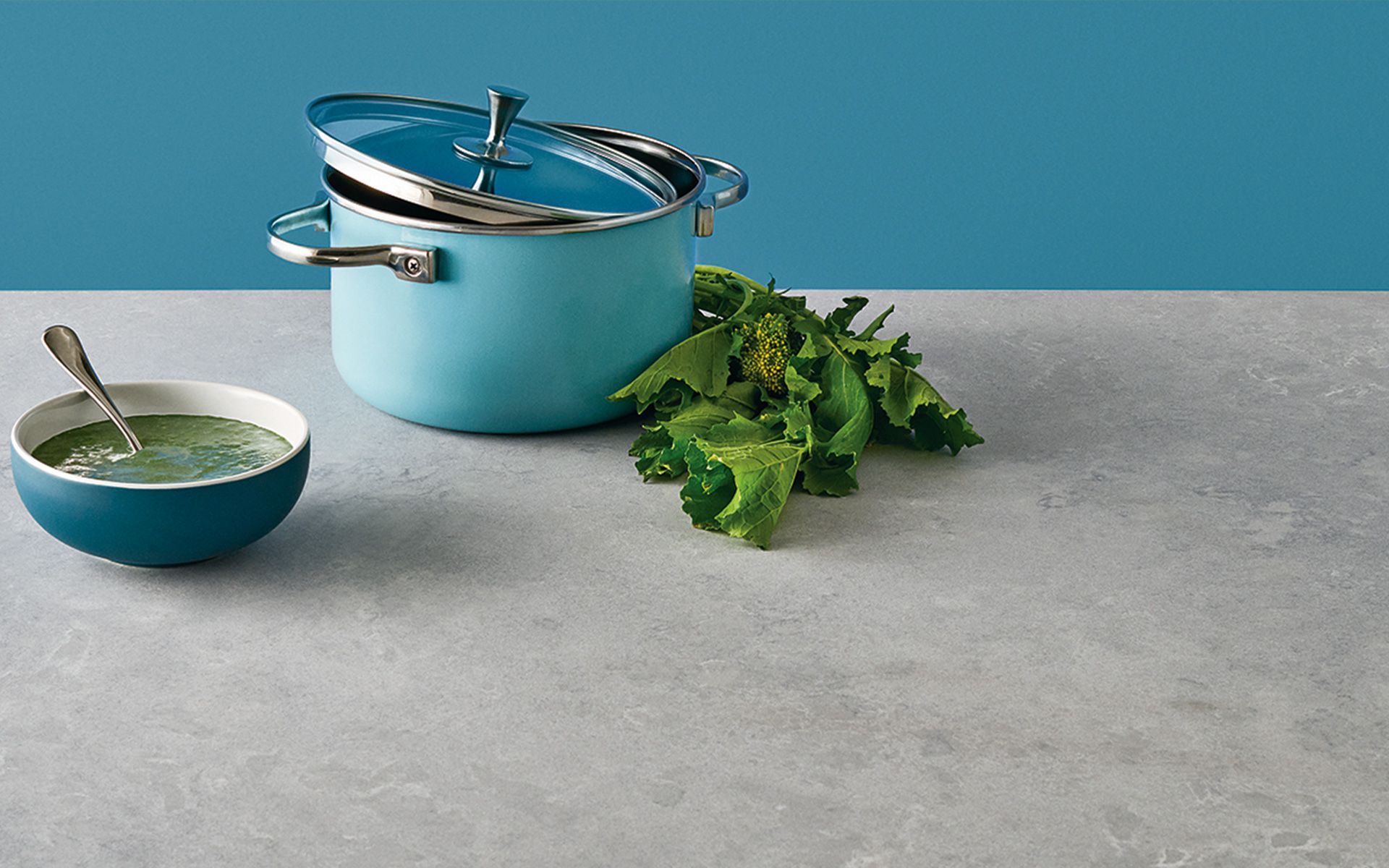
Shown: Caesarstone Airy Concrete (4044)
Cambria® manufactures countertops in a large range of patterns and colors. They model some of nature’s most spectacular designs and include some very bright color choices as well.
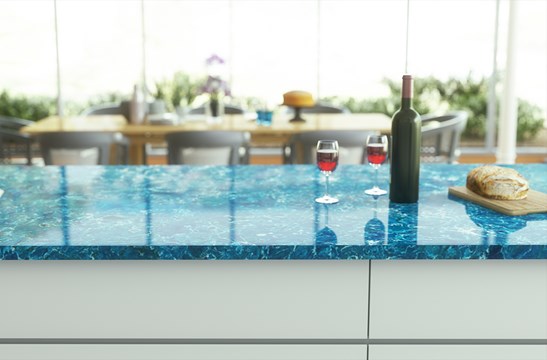
Shown: Cambria® Skye™ from their Waterstone Collection™
Alleanza Quartz™ features classy, traditional looks that are perfect for a timeless decor that will never seem dated. Their colors are drawn from a natural, earthy palette and their patterns are subtle.
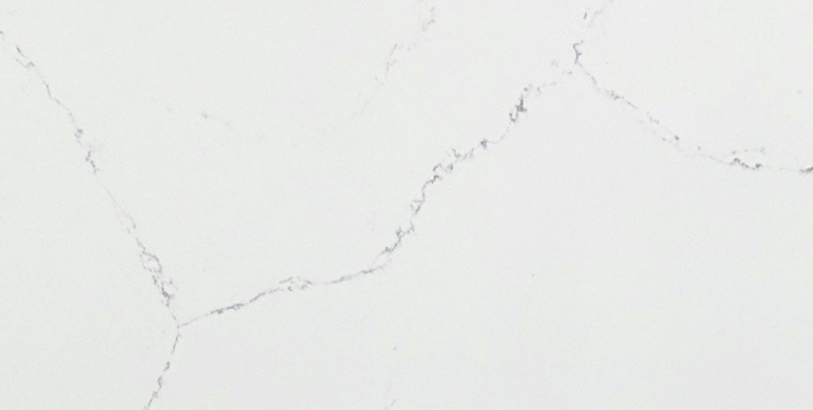
Shown: European Alleanza Quartz™ in Mystery White (AQ800)
Cosentino creates a variety of manufactured counter materials. One of their most established and enduring products is Silestone® Natural Quartz. Silestone® is made with 94% natural quartz making it an extremely hard material. Silestone® offers a variety of looks, but one of its newest surfaces, Eternal Noir, is all-drama with its black base and white-and-gold slashed accents.
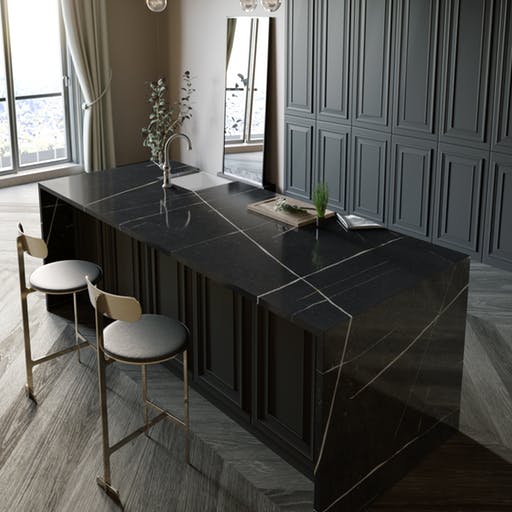
Shown: Silestone® in Eternal Noir
If you’ve decided on a Quartzite or Quartz countertop or you would like to learn more about them and see samples in person, set up a consultation with one of our experts, or stop by and see us! Click here to schedule a consultation.


